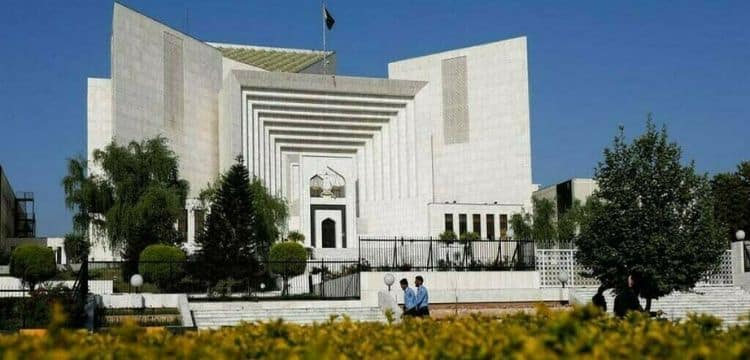[vc_row][vc_column][vc_column_text dp_text_size=”size-4″]
On the 23rd of October 2023, the apex court of the Islamic Republic of Pakistan achieved a significant milestone in reinstating the nation’s trust in one of the pivotal pillars of the state – the judiciary.
A distinguished five-member bench, presided over by Mr. Justice Ijaz ul Ahsan, courageously declared the trials of the alleged perpetrators of the 9th May 2023 riots in military courts as a constitutional affront, rendering them null and void. Consequently, the 103 accused of terrorism will face trials in Pakistan’s Anti-Terrorism Courts, rendering their previous military court proceedings legally inconsequential. This article examines the historical evolution and function of military courts in Pakistan, offers a brief summary of the May 9 events, and discusses the profound implications of this landmark judgment for upholding the rule of law.
The Supreme Court of Pakistan, in its succinct directive, deemed Section 2(1)(d) concerning “persons not otherwise subject to this Act” and Section 59(4) pertaining to “civil offences” within the Pakistan Army Act of 1952 as unconstitutional, rendering them legally ineffective henceforth. However, Justice Yahya Afridi reserved his judgment regarding the annulment of these specific provisions of the aforementioned Act. The court further asserted, ” It is further declared that any action or proceedings under the Army Act in respect of the aforesaid persons or any other persons so similarly placed (including but not limited to trial by Court Martial) are and would be of no legal effect”.
Also Read: NAB Laws Applicable To Both Army Officers and Judges, Justice Mansoor Ali Shah
In the context of this verdict and its implications, the events of May 9, 2023, take center stage. The arrest of former Prime Minister Imran Ahmed Khan Niazi, leader of Pakistan Tahreek-e-Insaf (PTI), on corruption charges, triggered violent protests and widespread destruction, including damage to symbols of military heritage. Subsequently, legal actions were taken against many political workers of PTI. Notably, many detainees faced military trials under the Pakistan Military Act of 1952, raising profound questions about the role of the armed forces, public trust in the judiciary, and concerns about human rights and international law violations.
In light of the breach of constitutional rights and its far-reaching implications for the public, a chorus of prominent voices, including former CJP Jawwad S. Khawaja, esteemed counsel Aitzaz Ahsan, Karamat Ali, Junaid Razzaq, and the Supreme Court Bar Association, and many others petitioned the highest court of Pakistan. Their impassioned pleas raised grave concerns for numerous human rights organizations and influential politicians. This serves as a testament to the enduring doctrine of the supremacy of constitution, rule of law, and the unwavering commitment to the separation of powers. In doing so, it safeguards the rights enshrined in the Constitution, reflecting a profound dedication to the principles that underpin the nation’s legal framework.
For the ultimate supremacy of the rule of law, it is prudent to condemn the use of military courts when there are dedicated anti-terrorism courts designed for the very purpose. It’s crucial to emphasize that the alleged perpetrators of the May 9 turmoil, charged with terrorism, are first and foremost citizens of Pakistan. Referring to them as political workers underscores their entitlement to the same constitutional rights as any other Pakistani citizen. The ‘right to freedom of association’ is unequivocally promised under Article 17 of the Constitution. Moreover, the right to freedom of assembly and association is enshrined in Article 20 of the Universal Declaration on Human Rights (UDHR), to which Pakistan became a signatory in 1948.
The judges in military courts lack competence, independence, and impartiality, failing to meet international fair trial standards. They lack independence from the military hierarchy, security of tenure, and required legal qualifications. Public trials, a crucial element of justice, are restricted by the Army Act, which also bars superior court appellate jurisdiction over military court decisions. Moreover, Military Appellate Courts lack legal expertise and judgments lack reasoned explanations, all violating the ‘right to a fair trial’ under Article 10A of the Constitution i.e., the right to a fair trial. This right is echoed in Article 14 of the ICCPR and Article 10 of the UDHR, emphasizing the need for a fair, just, and public hearing.
Effective rule of law demands a clear separation of powers among the state’s branches. The judiciary’s role is to impartially adjudicate convictions in accordance with the law and must remain free from external influences. Justice, in its purest form, admits no discretion; it mandates that the law be the ultimate authority in any democratic constitutional system. As the esteemed jurist Tom Bingham, former Lord Chief Justice of England and Wales, emphasized in his seminal lecture on the doctrine of the rule of law, “questions of liability should ordinarily be resolved by the application of the law and not the exercise of discretion.” In stark contrast, military tribunals often operated under the shadow of executive discretion, with little regard for due process of law.
This verdict, to some extent, succeeds in reinstating the nation’s trust in the judiciary. However, following the enactment of the Supreme Court (Practice and Procedure) Act on October 11th, all cases that fall under Article 184(3) of the Constitution, now enjoy the right to appeal the Supreme Court’s decisions to a full-member bench. This has raised concerns among constitutional experts about the potential for reversal. Yet, the true essence of justice lies in upholding the supremacy of Pakistan’s organic law and safeguarding the fundamental rights it envisions. If this is the yardstick by which justice is measured, then this verdict exemplifies justice. The people of Pakistan hope and pray that those responsible for orchestrating the nationwide destruction on May 9 will face appropriate punishment. However, this punishment must be the outcome of due process of law, free from the discretion of any state institution. This is how justice prevails in democratic states, and the situation in Pakistan should be no exception.
[/vc_column_text][/vc_column][/vc_row]











